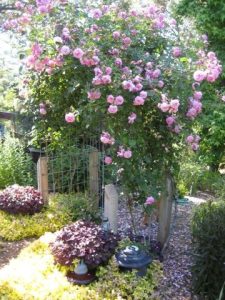Like many people, native bees are vegetarians that eat food grown close to home. The smaller the bee, the closer to home it must stay for its food-plant nectar and pollen. The smallest bees can travel only a few yards; the largest bumblebees may journey over a mile.
California’s nearly 2000 species of native bees are essential for filling the pollination gap created by imperiled European honeybees. Unlike honeybees, most native bees cannot be transported from crop to crop; instead they depend on us to ensure habitat near home.
Bees are vital to our wellbeing, making possible more than 100 crops in U.S. and Canadian gardens and farms. And, their labors help ensure survival of countless wildlife species. They provide for nectar, seeds, berries, and new plants to nourish animals from the grizzly bear to the tiniest hummingbird.
Although many creatures assist in plant pollination, bees are the primo workers. Their hairy bodies readily pick up and carry pollen from one plant to another. Bees also tend to visit one particular plant species on a given foraging trip, a behavior called flower constancy. This is important since pollen is wasted if delivered to the wrong kind of plant.
Here are a few of the many different native bees you might find in your yard. These peaceful insects rarely sting unless provoked.
Bumblebees make homes in hollow trees and in rodent burrows. They are among the first bees to emerge in the spring and the last to disappear in fall. They are superb pollinators of blueberries, cranberries, clover, and native lupine.
Bumblebees can “buzz pollinate” by hanging on a flower and vibrating with their flight muscles to release pollen. Because of this special skill, they are imported to pollinate commercial greenhouse tomatoes, though it is thought that these “alien” bees spread diseases in native bumblebees.
Squash and Gourd Bees help pollinate up to eighty percent of our squash, pumpkins, and melons. They live in tunnels in the ground and are early risers, up even before dawn.
Mason and Leafcutter Bees select hollow stems and above-ground beetle and borer holes in which to build a series of nest chambers. They carry pollen underneath their bodies rather than on their legs like most bees. Mason bees are first-class pollinators of many fruit crops, toiling long hours and in inclement weather.
Sweat Bees are so named because they are attracted to human sweat for its salt content. Some have a metallic sheen. Several are important pollinators of sunflowers and watermelons. They make their homes in tunnels in bare ground.
How to Help The Xerces Society for Invertebrate Conservation recommends these steps to conserve health and diversity of local pollinators:
Create A Variety of Blooms. Grow an assortment of flowering plants that bloom from early spring through fall. Include California native plants which attract four times more native pollinators than do non-native plants. Avoid double-petaled ornamental flowers which are often bred to produce little pollen. Wildflowers and weeds including vinegar weed, clover, and mustard, plus vegetable flowers, such as cabbage and lettuce that have bolted, also supply pollen.
Protect Nests And Egg-Laying Sites. Provide places for homes in open, untilled ground, rodent burrows, and old tree snags. Consider adding mason bee homes by hanging bee blocks or bundles of hollow-stemmed plants.
Don’t Use Pesticides. Most lawn and garden pest problems can be solved without chemicals (www.ipm.ucdavis.edu).
Be Informed. Every bee-friendly garden, whether window box or farm, helps create a safe habitat for our declining bees, native and honeybees alike.
Learn more from the Xerces Society’s new book, “Attracting Native Pollinators” ($30, www.xerces.org. 503-232-6639) or visit http://nature.berkeley.edu/urbanbeegardens/.
June 20-26 was National Pollinator Week. In Vera Strader’s Sonora garden, bees are celebrating in the nectar-rich blossoms of native sages and desert willows.


